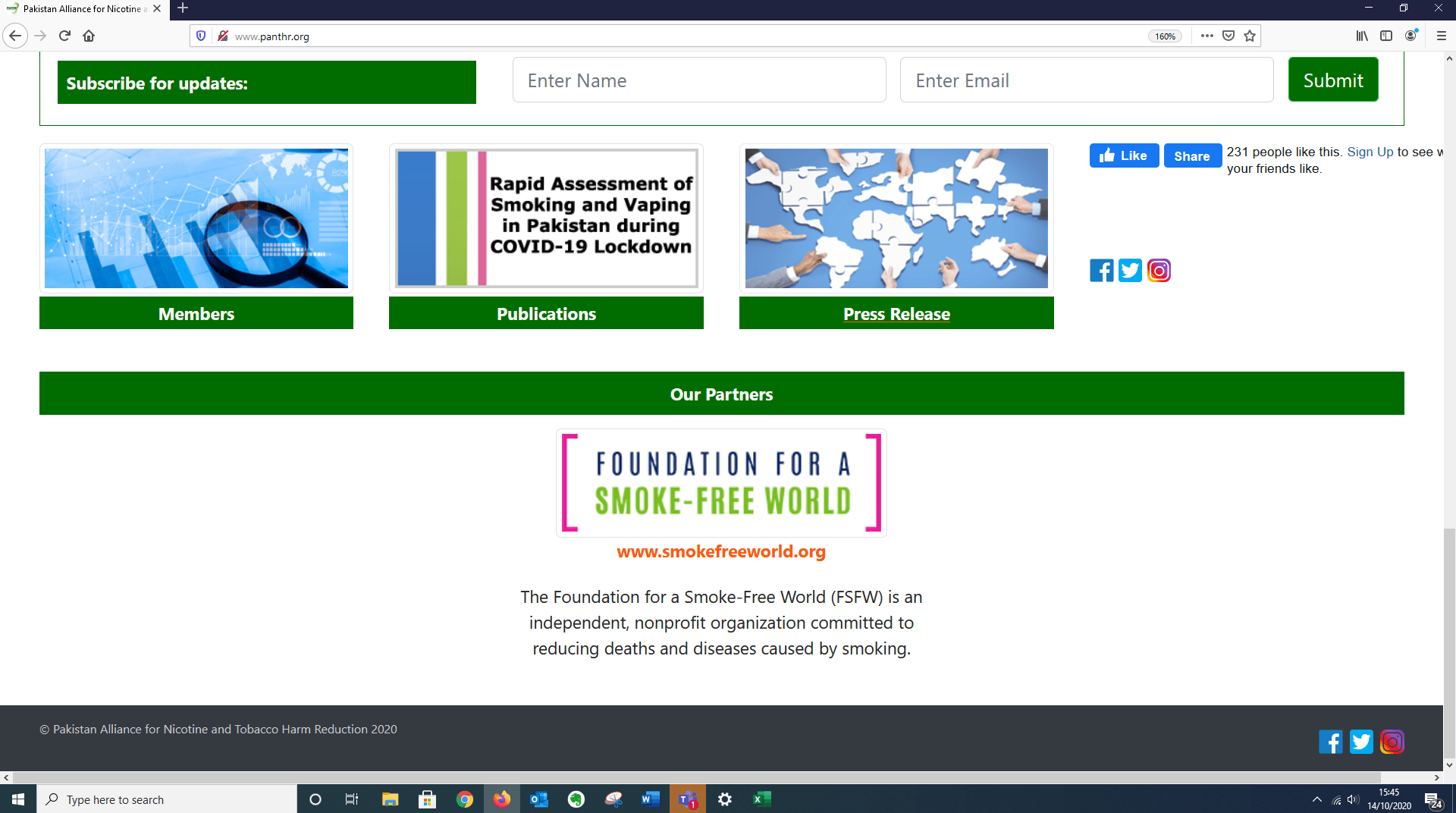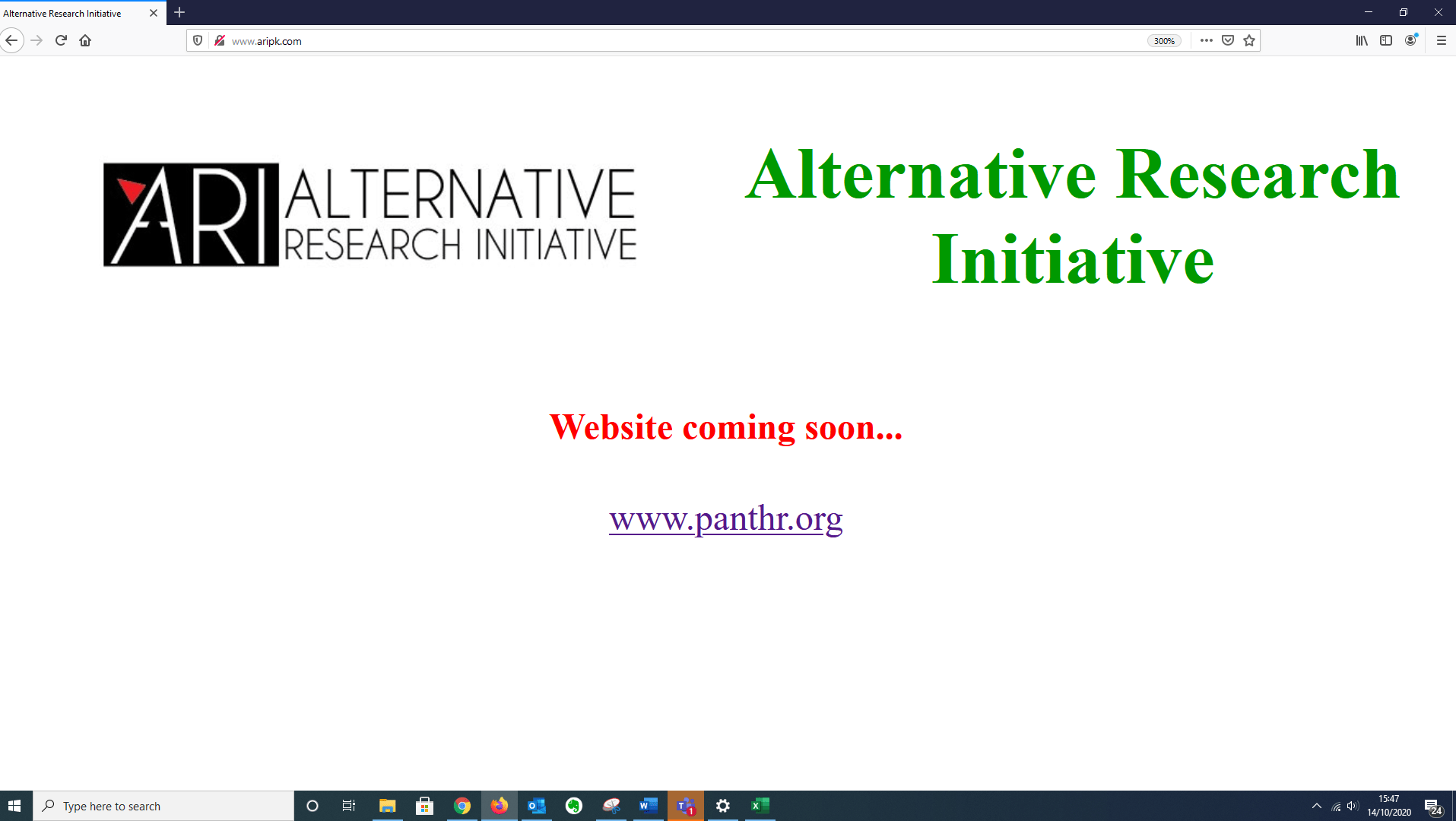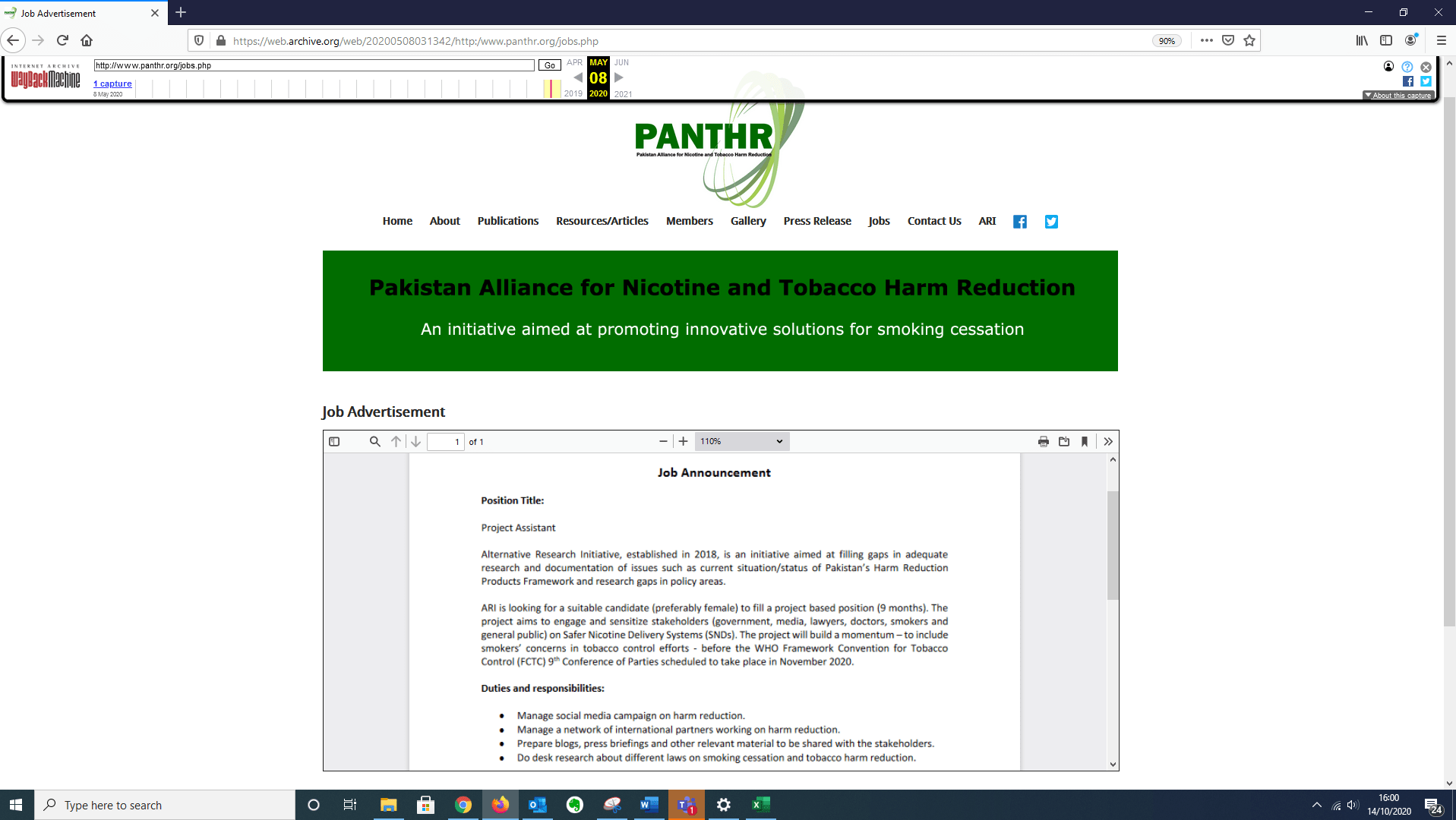Pakistan Alliance for Nicotine and Tobacco Harm Reduction (PANTHR)
This page was last edited on at
Pakistan Alliance for Nicotine and Tobacco Harm Reduction (PANTHR) is a project of Alternative Research Initiative (ARI). Its stated aim is to promote “innovative solutions for smoking cessation”.12
PANTHR’s website states that the Foundation for a Smoke-Free World (FSFW), a foundation wholly funded by Philip Morris International (PMI), is its sole partner.1
ARI has received funds from FSFW since 2018.13
In 2020, PANTHR listed 13 member organisations in Pakistan from diverse backgrounds including youth development, education and women’s rights.1 See below for details of these organisations. In 2023, it appeared to have more than 80 members, including an e-cigarette company STLTH.4
In 2020, PANTHR described itself as part of an alliance working in “22 countries” in the Eastern Mediterranean Region (PANTHR EMR).5:
“The alliance serves as a platform for advocating and promoting all innovative solutions for ending smoking whether counselling, NRTs, or harm reduction.”5
However, in 2023, the EMR page of the PANTHR website no longer appeared to be accessible.2
Relationship with the tobacco industry
According to its website, PANTHR is a project of the Alternative Research Initiative (ARI). FSFW paid ARI US$161,780 in 2018, US$123,420 in 2019, and US$244,574 in 2020 for several projects.36 FSFW’s grant register lists outputs of ARI projects with hyperlinks to the PANTHR website. See the list of PANTHR publications (below) that correspond to FSFW grants to ARI. PANTHR has issued press releases under the ARI logo and its publications are branded with ARI and FSFW logos (see below).
For the year 2020, FSFW provided ARI with a grant amounting to US$ 176,400 with the title “COP9 -Increasing Awareness”.3 6 Its purpose is stated as establishing an alliance secretariat for a regional network in the EMRO region ahead of WHO FCTC 9th Conference of the Parties (COP9), which had been originally scheduled to take place in November 2020, but was postponed due to the Covid-19 pandemic.3
According to the FSFW grant description, the expected outcome of this project was to “garner consensus and support” for the parties “to consider harm reduction as integral to tobacco control”.37 In May 2021, FSFW was listed as PANTHR’s only partner (Image 1).1 This was still the case two years later.2
- For more information on FSFW grants see Alternative Research Initiative

Image 1: PANTHR website displays FSFW as its sole partner (Source: panthr.org)
Initially the ARI website contained no content other than a link to the PATHR website (see Image 2).8 ARI, the organisation named on FSFW grants, features PANTHR’s publications on its website.9 As of 2023, PANTHR continues to be listed as ARI’s only project.10
- For more information see Alternative Research Initiative.

Image 2: In 2020, the ARI website just consisted of a link to the PANTHR website. (Source: aripk.com)
Activities
Activities targeting FCTC 9th Conference of Parties (COP9)
In 2020, ARI received funding from FSFW targeting COP9 (see PANTHR relationship with tobacco industry above).3 An advertisement for a job at ARI was posted on PANTHR’s website in 2020 (Image 3) which described the expectation of the project as to “build a momentum to include smokers’ concern in tobacco efforts before the COP9”.11

Image 3: Job advertisement posted on PANTHR website for a position targeting FCTC COP9 (Source: panthr.org)
Survey on Smoking and Vaping during COVID-19 Lockdown
PANTHR conducted a survey on the impact of Covid-19 assessing availability and accessibility of vaping and smoking in Pakistan during the lockdown due to Covid-19.12 The survey collected primary qualitative data from 120 respondents in 11 districts during April 2020 and was funded by FSFW (for details, see the publications below).12
Outputs
Press Releases
In January 2020, The Nation published a news article titled “PANTHR for stakeholders’ role in tobacco control consultations”.7 It quoted Kashif Farooqi, PANTHR’s Manager Advocacy as saying: “In the tobacco control efforts in Pakistan, no members from the smokers’ community and those working on harm reduction are being engaged”.7 He further said that smokers’ views have always been ignored in Pakistan. “As the main beneficiaries, smokers’ voice should be heard loud and clear. According to the article, he described PANTHR is an all-inclusive alliance of organizations and individuals who are committed to a tobacco free Pakistan, and said that:
“In UK, Japan, Sweden and New Zealand, harm reduction and safer nicotine delivery systems have helped in significantly reducing rates. It is time we in Pakistan also give harm reduction in the fight against tobacco epidemic.”7
PANTHR issued a press release on 30 April 2020 titled “Smokers face no difficulty in availability of cigarettes during lockdown” based on the survey it conducted.1213 The News International published the release on 3 May 2020 and quoted Kashif Farooqi, saying that “Cessation has to be main plank of tobacco control efforts in Pakistan if we want to end smoking”.]14
Farooqi issued a press release as PANTHR’s coordinator under ARI logo on 30 May 2020 targeting ‘World No Tobacco Day’ titled “PANTHR opposes call for ban on tobacco HRPs”.1516 In it, he contradicted the call by The International Union against Tuberculosis and Lung Disease (The Union) to prohibit the sale of e-cigarettes and heated tobacco products in LMICs. The press release has also referred to Public Health England’s advice in March 2020 that endorsed using e-cigarettes to quit smoking.15
In July 2020, Arshad Ali Syed, Project Director of PANTHR, issued a press release with the title “Make harm reduction, cessation part of tobacco control policies”, which stated smoking cessation is completely missing from the tobacco control efforts in Pakistan. 1718 The press release referred to a study by Sudhanshu Patwardhan, director of the Centre for Health Research and Education (CHRE), another organisation funded by FSFW.3 This study was co-authored by Jed E. Rose who is also closely linked with the tobacco industry.
In another news article by The News International, in September 2020, titled “Time ripe for inclusion of harm reduction in tobacco control policy”, Syed was quoted again saying “If smoking is to be eradicated, we need to understand the perspective of smokers and see what is needed to help them give up the habit of smoking”.19
In January 2021, ARI issued a press release promoting FSFW’s analysis of the 10th Meeting of WHO Study Group on Tobacco Product Regulation (TobReg) Report. The FSFW analysis criticises the WHO report and states the recommendations made “will seriously undermine progress needed to end smoking”. The FSFW analysis notes areas of oversight in the report which relate to harm reduction, transparency of the evidence base, and differentiation between products.2021
Further press releases can be found on the PANTHR website.
Publications
Rapid Assessment of Smoking and Vaping in Pakistan during COVID-19 Lockdown
On 30 April 2020, PANTHR published the report of the survey they conducted in April on the impact of COVID-19 on combustible smoking and vaping in Pakistan.1215 The report was branded with the logos of FSFW and ARI. Findings state that both vaping and smoking decreased during the lockdown but smokers did not face any difficulty with availability of cigarettes even though availability of vaping products were restricted.12
Knowledge, Attitude and Practice (KAP) Study on Vapers in Pakistan
The report of this study was branded with FSFW and ARI logos and cited as “submitted by” ARI.22 The study was conducted among customers in vaping (e-cigarette) outlets in Pakistan to determine knowledge, attitude and practices on using the products.22 The FSFW grant register lists a project entitled “Barriers to smoking cessation and harm reduction in marginalized communities” along with an output called “KAP Study on Vapers in Pakistan”. Although the report does not mention when the study was conducted, according to FSFW’s register, funding of up to US$164,560 was approved in December 2018 and completed in December 2019, with outputs available on PANTHR website.36According to the study findings, most Pakistani vapers were young, between 18 and 30 years old (87%), and nearly half of respondents (49%) said they took up vaping in order to look “cool”.22
Barriers to Smoking Cessation in Marginalized Communities and the Use of Harm Reduction Products in Islamabad, Pakistan
The corresponding study of this report is in FSFW grant register and the report is branded with FSFW and ARI logos.323 This is a qualitative study based on 48 key informant interviews. The study mentions affordability of cheap cigarettes, peer pressure and lack of law enforcement as main barriers to smoking cessation in marginalized communities. It recommends increasing knowledge on harm reduction products in order to address these issues.23
Mapping of Harm Reduction Products in Pakistan – A Status Report
A report published in 2018, branded with FSFW and ARI logos and corresponding to a project in the FSFW grants register, reviewed the legal status, regulatory framework, users, selling and advertising of harm reduction products (HRPs) in Pakistan.324 In its findings, it stated that there was a lack of availability of data on HRPs; a lack of clear and defined regulations for use, import and manufacturing of HRPs; and that stakeholders in tobacco control were taking a precautionary stance with HRPs following the position of WHO.24
For further outputs linked to FSFW, see the PANTHR and ARI websites.
Key Staff
The PANTHR website does not disclose its management structure, or whether it has any employees. However, in various communications and press releases in 2020, Arshad Ali Syed and Kashif Farooqi were quoted as spokespersons for the organisation.714
Member Organizations
In October 2020, the PANTHR website listed 13 member organisations, most of them working in development. 25
- Pakistan Vaping Community: A group of vapers and smoke-free-environment advocates that work to promote Safer Nicotine Delivery Systems.
- Youth Development Association (YDA): YDA is a voluntary organisation working for the social and economic development/ uplift of marginalized and underprivileged communities of Islamabad with special focus on youth.
- Media & Security Research Organisation (MASRO): A non-profit organisation established to work to bridge the information gap between the poor and prospective donors.
- Institute for Research, Advocacy & Development (IRADA): Independent social and policy development organization aimed at catalyzing participatory reform and development through innovative research, proactive policy strategies and vigorous capacity building initiatives.
- Pakistan Coalition for Education (PCE): An organisation working on education advocacy; right to education and girls education.
- Perfect Society: A non-profit organisation working for the rights of women.
- Humanitarian Educational Work and Development (HEWAD): A Quetta-based organization that works for women’s economic empowerment and right to information.
- Life Skills Consultants: A private consultancy firm providing capacity building services to community based and civil society organizations.
- Salar Development Foundation (SDF): A non-profit organization working for human development and to enhance people’s access to their rights.
- National Organisation for working communities (NOWC): A civil society organisation which aims to mobilize and organize workers, women and youth of marginalized working classes of Pakistan.
- Education, Research and Development Association (ERADA): A non-profit organisation working to eradicate poverty and uplift the quality of life of the rural population.
- Indus Environment Development Organization (IEDO): A non-profit NGO established in 2005 working on gender balance, peace and secure environment within communities.
- Indus Development Foundation (IDF): A non-profit organisation working for quality education for children and also responds to the emergency situations especially hill torrent floods.
Events
PANTHR’s website features images of meetings with partners to discuss “tobacco harm reduction” and “SNDS (Safe Nicotine Delivery Systems)” in Pakistan.26 The dates of the events, locations and the names of the attendees are not given.
Relevant Links
Pakistan Alliance for Nicotine and Tobacco Harm Reduction (PANTHR) website
Alternative Research Initiative (ARI) website
Tobacco Tactics Resources